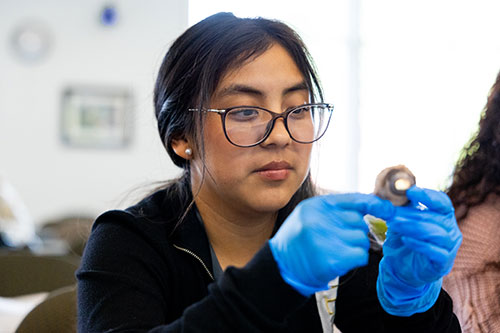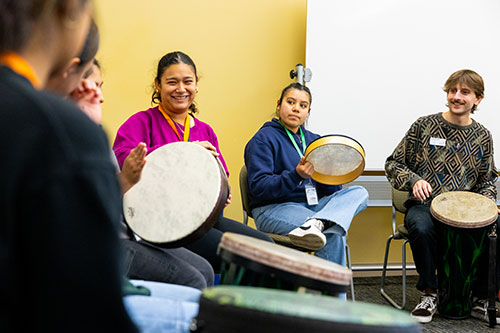Synapse Camp Opens Pathways To Healthcare Professions
 While the COVID-19 pandemic turned most everyone’s life plans upside down, it gave Vikram Javali clear direction on his future.
While the COVID-19 pandemic turned most everyone’s life plans upside down, it gave Vikram Javali clear direction on his future.
Now an incoming senior at Hillsboro’s Liberty High School, Javali began taking online science classes at the height of the pandemic, which introduced him to the medical profession. He also discovered an aptitude for math and science that, when combined with his desire to help others, is steering him toward a career in healthcare.
“I really want to help people,” Javali said, “and helping people using what I am best at is the best way to help them. Healthcare, math and science. It all fits.”
With the pandemic in the rear-view mirror and college on the horizon for students, the Synapse Healthcare Career Explorations Camp, held at Pacific University’s Hillsboro Campus, is giving a select group of Washington County high school students, including Javali, an immersive look at what a healthcare career could look like.
Hosted by Pacific University’s Oregon Healthcare Workforce Institute (OHWI), a regional center of the Oregon Area Health Education Center (AHEC) system, the camp is designed to provide immersive learning experiences that increase interest in healthcare careers.
The Hillsboro camp ran from June 17-21 for Washington County high school students. A second session, co-hosted with the University of Portland’s School of Nursing & Health Innovations, runs June 24-28 in Portland for Multnomah County high school students.
The camp, a partnership between OHWI, Pacific University, University of Portland, CareOregon, and WorkSystems, is also designed to increase diversity in the workforce. Of the camp’s 70 attendees, the majority come from Latinx/Hispanic households. Thanks to financial support from CareOregon and WorkSystems, students attend at no cost.
“Our primary objective is to diversify the healthcare field,” said Martha Robertson, AHEC program coordinator and the Synapse camp director. “We are selective in our enrollment and work to recruit underrepresented minorities. We work directly with high school counselors to find students who have an interest in healthcare and we try to expose them to as many fields as we can.”
Students and faculty from several programs in Pacific’s College of Health Professions are involved with both camps as counselors and presenters. The partnership exposes students to many aspects of the healthcare profession that are part of Pacific’s healthcare offerings.
That includes the School of Physician Assistant Studies, which opened Javali’s eyes on the opening day of the camp. He discovered the wide range of specialties that physician assistants can practice in, but with a degree that takes a shorter time to earn than an M.D.
“I learned that physician assistants are so broad and so generalized, they can be anything that they want to be,” Javali said. “They can be surgical PA’s or neurology PA’s or work in pediatrics. And that really attracted me because I like variance in jobs and knowing that every day is going to be slightly different.”
 The majority of the camp’s sessions are interactive and designed to give students hands-on experience with each healthcare specialty represented. That includes a therapeutic drum circle with a faculty member from Pacific’s music therapy program, practicing intubation skills with paramedics, learning how to suture with medical students, and dissecting and studying a cow eyeball with College of Optometry students.
The majority of the camp’s sessions are interactive and designed to give students hands-on experience with each healthcare specialty represented. That includes a therapeutic drum circle with a faculty member from Pacific’s music therapy program, practicing intubation skills with paramedics, learning how to suture with medical students, and dissecting and studying a cow eyeball with College of Optometry students.
Annette Hernando Carrillo, who will be a junior at Forest Grove High School, was also drawn into the physician assistant session, where students dressed in scrubs and experience what it is like in an operating room.
“I was fascinated by the operating room and what we did there,” Carrillo said. “I like being in situations where I can take action and do something to make it better.”
The second half of the week provided job shadow experiences at seven different Hillsboro-based healthcare providers, including Pacific’s optometry, audiology and interprofessional clinics, and the Pacific-partnered Virginia Garcia Memorial Health Center. Students also participated in a speed networking session with College of Health Professions students and received training from Washington County Public Health on the use of Narcan to prevent overdose deaths.
On the final day of the camp, staff members from Pacific’s financial aid and admissions offices provided bilingual presentations designed to get campers thinking about college before the week concluded with a tour of Pacific’s Forest Grove Campus.
Those presentations included information on the Pacific Priority program, which provides guaranteed admission to seven of the university’s healthcare graduate programs once prospective undergraduate students are accepted and deposit to the university, as well as a four-year undergraduate graduation guarantee.
“Students see many of these programs as inaccessible, so we highlight not only the facilities but the students,” Robertson said. “We have students and faculty who are going above and beyond to design hands-on, interactive workshops. Campers work one-on-one with healthcare students so they can ask questions that they might be too timid to ask faculty.”
Carrillo already plans to attend Pacific and said her experience at the Synapse camp only reinforces her choice. “I want to major in biology,” she said. “I think it will give me more insight into the body and Pacific will make me more prepared for medical school.”
Javali had heard of Pacific University but did not know about its strength in the health professions. After his experience at Synapse, Pacific is now on his list of prospective colleges.
“Other than what a friend that went to Pacific told me, I didn’t really know anything about it,” Javari said. “This is a genuinely good college for health sciences and it’s not far from home. I am really considering it.”


